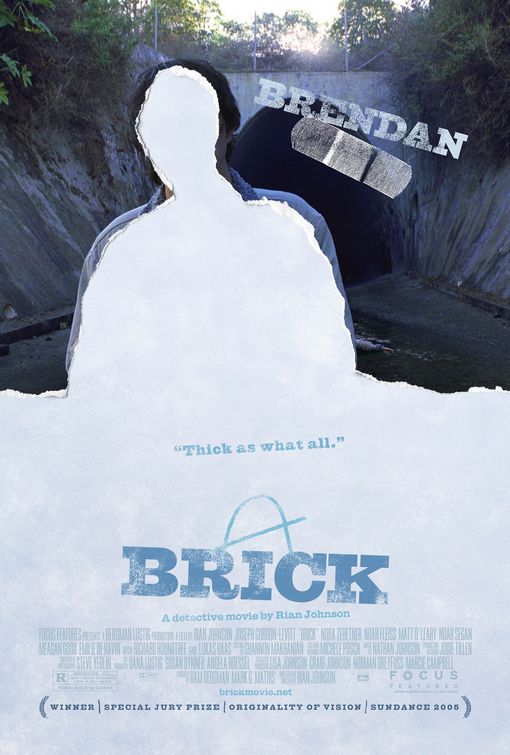
Heart of darkness
Never tried to hide the fact that film noir is probably my favorite genre, ever. Three reasons: the first is its unrelenting nihilism; the second is the quality of visual narrative (and just how damn beautiful a good noir looks); the third is the wit of the characters and dialogue. Okay, "wit" maybe overselling it, "soul-dead sarcasm" is a bit better. But a good noir isn't just villainous dames and harsh black lighting: it's the recognition that the only way to handle a world in which Goodness isn't just absent, it was beaten in an alley and shot, is to laugh scornfully. By all these tokens, Brick is the best film I've seen in 2006 and likely to remain that way.*
A man gets a call from an ex-lover, desperate. She talks about a "brick" and a "pin" and a "tug." He asks around, finds out she was involved pretty deep with a heroin ring. He just starts to pull aside the curtain on this ring when she ends up dead in a drainage ditch. He gets angry. All of the characters are in high school. Classic noir scenario.
You did know it was about high-schoolers, right? I feel that's the most important element of the film in some ways, and also the one that's been discussed the most. And amazingly, almost everyone seems to regard it as a gimmick.
I'll concede readily that it's like no real-world high school; but when did any film noir take place in the real world? It is and has always been a highly stylized type of storytelling. And casting a noir with adolescents is hardly a gimmick, at least in this case. Almost inevitably I find myself thinking of Veronica Mars, the other great contemporary high school noir. In that case, high school is a metaphor and shorthand: the noir hero is by necessity an outsider, and who doesn't feel like an outsider during those four years? Here, the high school setting is key to establishing the total nihilism of the piece. Like last year's great neo-noir, Sin City, this film takes the moral world of the classic <em">noirs to their logical extreme.
Imagine, if you will, Humphrey Bogart's Sam Spade as an 18 year-old. I like to think that he's a hopeless romantic, and it was only a lifetime of disappointment that turned him into the hard-boiled cynic of The Maltese Falcon. Not so for Brendan Frye (Joseph Gordon-Levitt), who at that age has long been a ruthless bastard. Thus Brick's genius: it assumes a world in which the nihilism of film noir has become so pervasive it even infects kids. There's no innocence, no safety, and that total lack of a safe place pushes the movie where even the bleakest classics couldn't go.
What makes this all work is how totally director Rian Johnson (in his feature debut, talented sonofabitch) hews to the template of the genre. Everything a noir needs is here, logically corrupted: instead of a bent cop, we have a crooked vice principal;instead of a loyal whore hiding the villain, we have his single mother; instead of a smoky, seedy bar, we have a run-down pie shop. The cinematography is just about as bleak as a color film can get (and the use of color, especially red, is striking in this film, if one of the few ways in which it's not a true noir), and the striking, strange angles and lighting make this one of the most faithfully Expressionist American films I've seen since the noir heyday. And of course, the dialogue - where the "fun" comes in - with its outlandish, made-up argot, full of lines so hard boiled you could drive a nail with the egg: "I've got five senses and I had a full night's sleep, so that puts me six up on you"; "Make sure you really wanna know what you wanna know"; I'm not going to ruin it for you.
None of this would work without a cast that knew how to sell it, and the film has one. Gordon-Levitt is amazing as the lead, with a look and voice so grim you'd think that smiling would crack his head open. Lukas Haas (where's he been?) is slimy and pitiful in the right measures as the heroin pushing villain (although "villain" is such an arbitrary word in film noir). Best of all is Noah Fleiss (who has been in things, none interesting) as the dumb muscle, who like all good dumb muscle lets the audience see the exact moment that he realizes he's just dumb muscle, and good God does he feel betrayed. Johnson has made it clear that his chief inspiration was the work of Dashiell Hammett, and Fleiss calls to mind nothing less than Wilmer Cook from The Maltese Falcon, in his horror at finding just how expendable he really is. The last key to the cast is Nora Zehetner as the femme fatale; from the moment she first appears in a red kimono she absolutely owns the sexual force that any such character needs to exude.
The really important part of the whole endeavor is that at no point do the actors or the script wink. Having set up the giant wink of "high school noir," Johnson and his cast and crew treat it with the utmost seriousness. I don't want to make it sound like it's not fun; it's a hell of a lot of fun, just like the genre has to be. Remember what I said up top? The best part of noir is how it laughs at total nihilism. Make no mistake: for all the death and drugs and lies, this is a joyride.
*Of course, having made the rounds of the 2005 festival circuit, calling it a "2006 film" is a little disingenuous. Also, quick whine: I could have seen this six months ago. I even remember reading about it in the Chicago Film Fest guide. "Joseph Gordon-Levitt?" I thought. "That Third Rock kid? Um, pass." Fuck you, me-of-the-past.
A man gets a call from an ex-lover, desperate. She talks about a "brick" and a "pin" and a "tug." He asks around, finds out she was involved pretty deep with a heroin ring. He just starts to pull aside the curtain on this ring when she ends up dead in a drainage ditch. He gets angry. All of the characters are in high school. Classic noir scenario.
You did know it was about high-schoolers, right? I feel that's the most important element of the film in some ways, and also the one that's been discussed the most. And amazingly, almost everyone seems to regard it as a gimmick.
I'll concede readily that it's like no real-world high school; but when did any film noir take place in the real world? It is and has always been a highly stylized type of storytelling. And casting a noir with adolescents is hardly a gimmick, at least in this case. Almost inevitably I find myself thinking of Veronica Mars, the other great contemporary high school noir. In that case, high school is a metaphor and shorthand: the noir hero is by necessity an outsider, and who doesn't feel like an outsider during those four years? Here, the high school setting is key to establishing the total nihilism of the piece. Like last year's great neo-noir, Sin City, this film takes the moral world of the classic <em">noirs to their logical extreme.
Imagine, if you will, Humphrey Bogart's Sam Spade as an 18 year-old. I like to think that he's a hopeless romantic, and it was only a lifetime of disappointment that turned him into the hard-boiled cynic of The Maltese Falcon. Not so for Brendan Frye (Joseph Gordon-Levitt), who at that age has long been a ruthless bastard. Thus Brick's genius: it assumes a world in which the nihilism of film noir has become so pervasive it even infects kids. There's no innocence, no safety, and that total lack of a safe place pushes the movie where even the bleakest classics couldn't go.
What makes this all work is how totally director Rian Johnson (in his feature debut, talented sonofabitch) hews to the template of the genre. Everything a noir needs is here, logically corrupted: instead of a bent cop, we have a crooked vice principal;instead of a loyal whore hiding the villain, we have his single mother; instead of a smoky, seedy bar, we have a run-down pie shop. The cinematography is just about as bleak as a color film can get (and the use of color, especially red, is striking in this film, if one of the few ways in which it's not a true noir), and the striking, strange angles and lighting make this one of the most faithfully Expressionist American films I've seen since the noir heyday. And of course, the dialogue - where the "fun" comes in - with its outlandish, made-up argot, full of lines so hard boiled you could drive a nail with the egg: "I've got five senses and I had a full night's sleep, so that puts me six up on you"; "Make sure you really wanna know what you wanna know"; I'm not going to ruin it for you.
None of this would work without a cast that knew how to sell it, and the film has one. Gordon-Levitt is amazing as the lead, with a look and voice so grim you'd think that smiling would crack his head open. Lukas Haas (where's he been?) is slimy and pitiful in the right measures as the heroin pushing villain (although "villain" is such an arbitrary word in film noir). Best of all is Noah Fleiss (who has been in things, none interesting) as the dumb muscle, who like all good dumb muscle lets the audience see the exact moment that he realizes he's just dumb muscle, and good God does he feel betrayed. Johnson has made it clear that his chief inspiration was the work of Dashiell Hammett, and Fleiss calls to mind nothing less than Wilmer Cook from The Maltese Falcon, in his horror at finding just how expendable he really is. The last key to the cast is Nora Zehetner as the femme fatale; from the moment she first appears in a red kimono she absolutely owns the sexual force that any such character needs to exude.
The really important part of the whole endeavor is that at no point do the actors or the script wink. Having set up the giant wink of "high school noir," Johnson and his cast and crew treat it with the utmost seriousness. I don't want to make it sound like it's not fun; it's a hell of a lot of fun, just like the genre has to be. Remember what I said up top? The best part of noir is how it laughs at total nihilism. Make no mistake: for all the death and drugs and lies, this is a joyride.
*Of course, having made the rounds of the 2005 festival circuit, calling it a "2006 film" is a little disingenuous. Also, quick whine: I could have seen this six months ago. I even remember reading about it in the Chicago Film Fest guide. "Joseph Gordon-Levitt?" I thought. "That Third Rock kid? Um, pass." Fuck you, me-of-the-past.
Categories: crime pictures, film noir, movies for pretentious people






